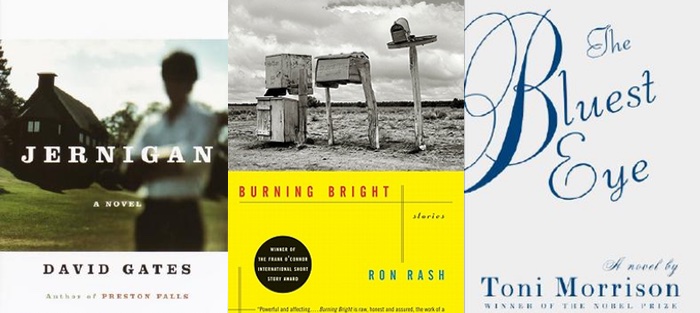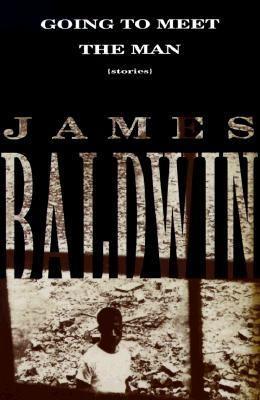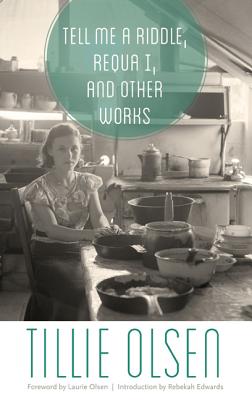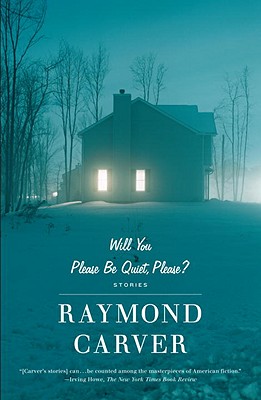What if I told you that shame for my father is the most powerful feeling of love I’ve ever had? What if I told you that my shame was an act of empathy? That when my sister died fourteen years ago, and my father could have stopped it, I forgave him?
Her name was Terry. She had Down Syndrome. She was forty and I was twenty-six. The details of her illness are boring. What matters is that my father didn’t get his daughter medical care when she needed it. I blamed him when she died, but also felt I had to protect him from blaming himself. My biggest fear was that he’d realize how much my sister’s death might have been his fault.
In a writing workshop at the Bennington Writing Seminars, there was a discussion about blame and shame in fiction. I realized that my favorite stories and novels recreate a dynamic of shame between the reader and a character, especially when those characters are parents. I love when a writer asks me to forgive a parent despite the pain they’ve caused their child. The writers I return to again and again turn their readers into children who want to protect their parents, even when they do wrong.
Readers love these characters. But why or how—how is it that we can forgive Peter Jernigan in the novel Jernigan for drunkenly pulling a gun on his son? How can we forgive parents who steal from their child so they can go buy crystal meth in Ron Rash’s “The Ascent?” Can we possibly empathize with Cholly Breedlove’s despair when we know he will rape his daughter in The Bluest Eye?
In an essay on Kurt Vonnegut, George Saunders said that a story was “a kind of black box the reader enters. . . . He enters in one state of mind and exits in another.” But whatever change it is that takes place inside the black box, it can’t be forced; it occurs within the reader. What I wanted to know after realizing that I’m a sucker for bad parent stories, is this: How does fiction about these parents work on us in the same way that love and pain worked on me to ultimately forgive and try to protect my father?
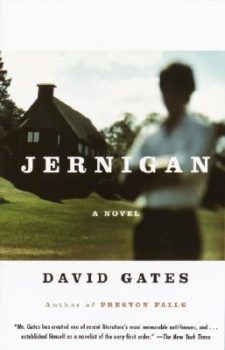 One of my favorite bad dads is from the novel Jernigan by David Gates. It’s on page two we learn that Jernigan’s been driving through a snowstorm all night wasted on gin. That’s the same page we find out he’s a father, who’d begged his son to come on the trip with him. It doesn’t take much to imagine why Danny decided not to come along. The novel has hardly begun and we’re already torn about this character as a father. We understand he loves his son, but we also know he shouldn’t be responsible for him. Then we find out he’s recovering from the death of his wife, Judith, which makes his behavior if not excusable, at least more understandable. Jernigan feels guilty for enabling Judith’s alcoholism. He’s one of the reasons she drank. The last thing he sees before she’s killed by an oncoming van is her backing out of the driveway drunk at “twenty miles an hour, looking not over her shoulder but right into [his] eyes: with hate.”
One of my favorite bad dads is from the novel Jernigan by David Gates. It’s on page two we learn that Jernigan’s been driving through a snowstorm all night wasted on gin. That’s the same page we find out he’s a father, who’d begged his son to come on the trip with him. It doesn’t take much to imagine why Danny decided not to come along. The novel has hardly begun and we’re already torn about this character as a father. We understand he loves his son, but we also know he shouldn’t be responsible for him. Then we find out he’s recovering from the death of his wife, Judith, which makes his behavior if not excusable, at least more understandable. Jernigan feels guilty for enabling Judith’s alcoholism. He’s one of the reasons she drank. The last thing he sees before she’s killed by an oncoming van is her backing out of the driveway drunk at “twenty miles an hour, looking not over her shoulder but right into [his] eyes: with hate.”
Because Jernigan is funny, charming, and in pain, I made excuse after excuse for him. These excuses lasted until he drops by his old house for a bottle of gin he keeps behind the Quaker Oats. Structurally, it’s the perfect time to disappoint the reader. Halfway through the novel, it’s too late for us to turn back—we care about these people too much. Jernigan finds Danny’s friend Dustin at his house. Dustin tells Jernigan that Danny might be thinking of suicide. The reader’s temporarily relieved and filled with hope when Jernigan decides not to get the bottle of gin. “I couldn’t,” he says. “Not and live with myself. This had turned into a night where you stayed sober and did your best to handle something.”
Our hope lasts about thirty seconds until the reader makes it further down the page. The thought of having a phone conversation with Dustin’s father tips the scales in the gin’s favor, and Jernigan takes the bottle. Dustin kills himself that night and we don’t know whether to blame Jernigan or not. This ambiguity eats away at the reader in the same way it’s eating away at Jernigan, and it saves us from blaming him completely. But we also know that it could have been Danny, and if it had been, his father would likely have been too drunk or self-consumed to notice anything was wrong.
In the beginning of the novel, Jernigan’s worried about how headphones or loud music could damage his son’s hearing. He frets over using “why” questions when talking to Danny because those seem judgmental. By the end, he’s pissed himself and is pointing a gun at his son and shoots it at the amplifier in the room, music being one of the only things the kid seems to care about. Because it’s a first-person novel and we’re in Jernigan’s head, we know he’s constantly thinking about how to be a good father to Danny, but things fall apart almost every time he interacts with his son. In this way, we get both Jernigan’s best intentions as a father and his worst actions.
At one point, to salvage something with Danny, he decides they should cut down a Christmas tree together. This is the kind of thing that good dads do, he thinks, and we agree. Danny responds, “So I won’t kill myself like Dustin?” Jernigan can’t help replying sarcastically, “You know, you’re really beginning to show some promise there. Keep it up and by the time you’re my age you might be just as big a prick as your old dad.” But the next day, once they’re on the road, Jernigan feels tenderly toward his son again. Danny’s asleep in the passenger seat and Jernigan is momentarily afraid he’s dead. He relaxes once Danny takes a breath. He reaches over and locks Danny’s door, knowing it’s a worthless gesture, especially because Danny’s asleep, unaware of his father’s concern. These moments of vulnerability play on our empathy, but it’s also Jernigan’s self-awareness about his parental failings that allow us to root for him at the same time we’re ashamed of his behavior.
What the reader can’t quite forgive him for is that he stops trying at the end of the novel. Then again, he’s so ashamed of himself, he doesn’t feel he has the right to be Danny’s father anymore. And maybe we agree with him. In this way, the novel leaves its readers in the same place that Danny is in as his son—wanting something from Jernigan that he seems incapable of giving.
While writing this essay, I called my mother and asked her if she blamed my father when Terry died. We’d never spoken about it. She immediately said, “Of course not. I blame myself.” She’d left my father for another man a few years before. Though Terry was a daughter from my father’s previous marriage, my mother had raised her. When they divorced, she wanted custody, but my father was so hurt, he refused even though we all knew Terry would be better off with my mom.
Like Jernigan, my father was an alcoholic, but he was sober by the time my sisters and I were born. He replaced his addiction to alcohol with other addictions—all of them relatively innocuous—yet together, time consuming. He collected baseball cards and broken vending machines to fix. He was obsessed with making the perfect boiled peanut and beating his time on the New York Times crossword.
Jernigan grabbed that bottle of gin instead of sobering up to deal with what he thought was a suicidal son. My father was probably at a baseball card show or at the Atlanta farmer’s market getting another fifty-pound bag of peanuts instead of being at home with my sister, who was sick enough she shouldn’t have been alone.
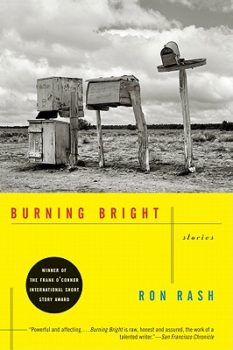 The parents in Ron Rash’s short story, “The Ascent,” are addicts, too. Their child dies because of their addiction. The story’s told from the point of view of the soon-to-be dead child, Jared. The reader’s on high alert on the first page of the story, as Jared wanders alone through the woods of Smoky Mountain National Park. He’s “not thinking about his parents . . . though they were the main reason he was spending his first day of Christmas vacation out [there].” He describes his house as feeling “sad.” We aren’t blaming or shaming yet, mostly because the story’s told through Jared’s matter-of-fact prose. He’s used to his crappy life.
The parents in Ron Rash’s short story, “The Ascent,” are addicts, too. Their child dies because of their addiction. The story’s told from the point of view of the soon-to-be dead child, Jared. The reader’s on high alert on the first page of the story, as Jared wanders alone through the woods of Smoky Mountain National Park. He’s “not thinking about his parents . . . though they were the main reason he was spending his first day of Christmas vacation out [there].” He describes his house as feeling “sad.” We aren’t blaming or shaming yet, mostly because the story’s told through Jared’s matter-of-fact prose. He’s used to his crappy life.
A story about bad parents can’t just be about the parents being bad over and over again. There’s a creeping dread in this story, which begins with a child, alone in the forest, hurrying to get out of the woods before the sun goes down. Rash gives us an airplane, too. We’re learning about Jared’s home life at the same time we’re learning about the search for an airplane crash in the area. Once Jared finds it in the woods, Rash has the perfect formula for a short story: druggie parents, a neglected child and a crashed plane with frozen bodies inside, who just happen to be wearing expensive jewelry. Despite the dead bodies, Jared calls the inside of the plane, “snug and cozy.” He steals a ring from the dead woman on the plane.
Two paragraphs later, the reader finds out why he’s been avoiding his parents. When he gets home, “the small red glass pipe was on the coffee table, an empty baggie beside it.” Rash then objectively gives us Jared interacting with his parents who are high. The mother places strips of aluminum foil onto a log and says, “It’s going to be our Christmas tree.” When Jared doesn’t respond, his mother’s smile quivers. She wants him to like it. The mother, though high, is loving toward Jared—she thinks she’s making something beautiful for their family.
When Jared accidentally drops the stolen ring from the plane, it’s no surprise when his father takes it and heads to town to “find out if it’s real or not.” When Jared wakes up later, he “smell[s] the methamphetamine . . . thicker than he could ever remember.” Rash renders the parents so dependent on the drugs they take, we feel bad for them. We don’t know, but we hope, they’d never act this way sober.
Jared’s father, while selling the ring for drug money, gets his son a mountain bike like the one he’s wanted for Christmas. Jared can tell it’s used. “Some of the blue paint’s chipped away, one of the rubber handle grips [is] missing, but the tires didn’t sag and the handlebars were straight.” Jared isn’t judging his parents or the gift, so we aren’t either. At least the tires are firm and the handlebars are straight, we agree.
A day later, his parents are down from their high, sick and jonesing for more drugs, his mother especially, but they’re out of money. Jared offers to give them back the bike. His parents say no, which keeps us from hating them. There are limits to what they are willing to take from their son at least. This is also a smart technical move—it affords Jared the opportunity to go back to the woods. I was relieved when Jared steals a Rolex from the wrist of the dead man on the plane to give to his father. I hated seeing his mother so miserable. Like Jared, I wanted her to get the drugs.
By the end of the story, we aren’t sorry for Jared anymore. Drawn to its coziness, he returns to the plane. He’s freezing to death, but the vision of him “taken off and risen so high that [he was] enveloped inside a cloud” makes us feel like he’s being taken care of. The frozen dead couple seem like the parents he should have had anyway. As he’s dying, Rash gives the reader an image of the parents on their way to town for more drugs. We know the horror and guilt—the shame—they’ll feel when they find out what’s happened. The story ends and Jared got away. The bulk of our empathy lies with the parents in the pickup truck. This ending works so well because the reader has knowledge the parents don’t. The sickening jolt we feel at the end of the story is what the parents will feel as soon as they know Jared is dead.
When I asked my uncle, who’d been like a second father to me, if he blamed my father, he said no, he was too fragile to blame. All you had to do was imagine Terry dying in his arms—which she did—right before the ambulance showed up. The ambulance he called too late.
When Terry’s body was laid out for the wake, my father entered the room and crumpled halfway to the casket. He stayed on the floor on his hands and knees with his head bowed, sobbing, for a few minutes. His brother, a priest, helped him to his feet and held his hand as they made their way across the room together.
My father aged rapidly after Terry died. A few months after the funeral, he was selling boiled peanuts on the side of the road—his weekend hobby—and had a series of strokes. He spent the next year with a slur, confused about events and details. It seemed to me that his body worked to do what I wanted to do, which was to protect him from the shame I felt for him, shame he must have felt himself. He died of a heart attack a year after Terry. My father, like Jernigan and Jared’s parents, paid big for his mistakes. Jernigan lost a thumb and his relationship with his son. Jared’s parents have a dead child. So did my father. It’s easier to forgive them once we know just how much they lost.
At the beginning of Toni Morrison’s The Bluest Eye, one of the narrators, Claudia, tells us that her and her sister’s faith and innocence are dead because of what happened to Pecola. “There is really nothing more to say—except why. But since why is difficult to handle, one must take refuge in how,” she says. Claudia says their faith and innocence were “no more productive than [Cholly Breedlove’s] lust or despair.” This implies at the outset of the novel that Cholly’s lust in some way is bred from his despair.
Claudia meets Pecola when her family is asked to care for the girl. Cholly’s in jail and Pecola’s family has been put “outdoors” as a result. To be “outdoors” means the family has no place to go. Claudia compares it to being “dead” in its utter permanence: “outdoors is here to stay,” she tells us. Morrison doesn’t give us the details of Cholly’s bad behavior yet, but describes him as “beyond the reaches of human consideration,” having joined “the animals.” To hear a human described in this way, while not knowing the details of his behavior, gives the reader space to empathize with him. We can’t judge his actions yet because we don’t know exactly what he’s done. And later, when Mrs. Breedlove attacks him for being too drunk and lazy to get out of bed to fill the coal stove, she seems culpable for at least some of the family’s misery.
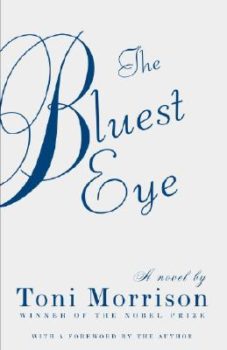 The details we do get about Cholly’s life make us pity him. Even something small like the description of the Breedlove’s sofa seems emblematic of his life. Like Jernigan, he has good intentions, or had them. His first purchase for their home is a sofa, but when it’s delivered to the house, there’s a large rip in it. Cholly still pays weekly installments on this couch that he’s grown to despise for what it represents: even when he tries to do good, the outcome will always be damaged.
The details we do get about Cholly’s life make us pity him. Even something small like the description of the Breedlove’s sofa seems emblematic of his life. Like Jernigan, he has good intentions, or had them. His first purchase for their home is a sofa, but when it’s delivered to the house, there’s a large rip in it. Cholly still pays weekly installments on this couch that he’s grown to despise for what it represents: even when he tries to do good, the outcome will always be damaged.
Point of view is as important in this novel as it is in Jernigan and “The Ascent.” The actual rape of Pecola is told from Cholly’s point of view first. Once we get past page four, we know it’s coming, but we don’t know how it happens until we hear his voice. Morrison knew it was essential for the reader to understand the deep psychological wounds that could lead someone into such a horrific act. Not only is Cholly abandoned by his mother on a junk heap by the railroad, he’s rejected by his father, too, after a long and arduous search. As we go deeper into Cholly’s history, we see a life defined by abandonment, shame and humiliation. His first sexual act is on the day of his aunt’s funeral when he is twelve. It is an innocent, childish affair until two white men show up. When Cholly stops and pulls up his pants, a man with a flashlight says, “Get on wid it. An’ make it good, nigger, make it good.” Cholly doesn’t move and the man cocks a gun at them.
The reader is horrified as the two children must simulate sex as the men watch. From that moment on, I allowed myself to feel compassion for him. It’s true—I knew what he was going to do to his daughter, but I couldn’t fully blame him for it. I felt empathy for Cholly, even while I felt empathy toward Pecola because of what he does to her. Many writing teachers tell new writers not to humiliate their characters. However, when one is dealing with a character like Cholly who commits the ultimate unforgivable act, humiliating him might be the only way to garner a reader’s empathy.
When we look at the structures of these novels and story, we see that though the actions of the bad parents are integral to the plot, there’s often another, more prominent, storyline. Or rather, the other storylines depend on the bad parenting.
The parents are an obstacle or an impending threat. These threats give the narratives imminence and energy. The reader reads on—just waiting for the bad to get worse. In Jernigan, we read as Peter Jernigan’s behavior becomes more and more problematic. His bad parenting might be the most devastating aspect of his alcoholism, but the main question we’re reading for isn’t, what’s he going to do to Danny next. It’s—is he going to do something so bad we can’t forgive him for it? In “The Ascent,” the story of the lost plane perfectly intersects with Jared’s bad parents as he freezes to death sitting behind his parental surrogates. And in The Bluest Eye, Cholly’s bad deed is only one of the injustices put upon his daughter. The question we read for in this novel is how do all of these stories add up to the story of Pecola and what she loses. She lives in an unjust world where the only people looking out for her are children, too. The parents in all of these stories are Chekhov’s gun on the wall.
So far I’ve discussed extreme examples of bad parenting, so let’s look at a more moderate example to illustrate this point. Pride and Prejudice is as much about bad parents as it is about Elizabeth and Darcy, maybe more so. The novel begins with a conversation between the Bennett parents and ends with their parental replacements, the Gardiners, being often at Pemberley.
The first two chapters of Pride and Prejudice are almost all dialogue. Like Ron Rash, Austen allows us to create own opinions of Mr. and Mrs. Bennett as they interact. They’re the best kind of bad parents because so much of the story depends on their blunders. The tension and resolution of the novel centers on them. Every time Jane or Elizabeth get close to freeing the family from—as Mr. Bennet puts it—being turned out of Longbourne as soon he dies, something happens to thwart their success. That “something happening” almost always goes back to the parents’ faults, either directly in the case of the parents humiliating Jane and Elizabeth at the Netherfield Ball, or indirectly, through Lydia’s elopement with Wickam. In all of these stories, it’s the children who free themselves from the consequences created by their parents: Jane and Elizabeth through their virtue and sense, Jared in his airplane, Danny in his refusal to go with his father, and Pecola who escapes through her madness and fake blue eyes.
I don’t know that my sister escaped anything and I don’t know if I could make my dad into a fictional character. There are too many conflicting narratives. But Morrison is right about the “how.” It’s true that I can’t explain why my father didn’t protect his daughter. I don’t understand why my sister had to die, but I can map out the events on a timeline and begin to understand something about my father and our family. Like Jernigan and Jared’s parents and Cholly and the Bennetts, my father’s parental behavior was complicated; he was neither fully innocent or fully blamable.
My mom blames herself. And maybe it starts there. Or maybe it starts with Terry’s real mom, who was worse than my father. Maybe it begins even earlier. In the ‘sixties when Terry was born, most children with Down Syndrome were institutionalized. And I can’t ignore my share of responsibility. When my sister started vomiting blood, I was likely at the Gap, trying on outfits for a date I had that night. I hadn’t always been as good to her as I could have been. And I loved my father, despite his faults. I went away to college. Terry was a terminal child, always forced to depend on our bad parents.
In describing his theory of time and narrative, the philosopher Paul Ricouer says that every human must deal with the “vertigo of our unfathomable origins.”
We confront the mystery of jumping into being at this specific time and place, of these particular parents . . . sensing that we might have been born in different circumstances and knowing only that our fate was fixed the moment we came into being.
If you’re like me, you sometimes look at your parents and think, what might I have been had I been born to different people? I think that about Terry. How long would she have lived? Maybe she would have had her own apartment. Or learned the piano. Or gotten married.
The reason why we love stories about mothers and fathers who do wrong is that we all have them. We all know them. And if we’re parents, we know we are them at one time or another. Those of us who are lucky, don’t do too much damage, but there’s always the threat of what could have been or what could happen next time.
In fiction, we get to shape the stories and characters we write. When we do so, if we can find the place to write from—perhaps that child within us, who so desperately wants our parents to be good even when they are bad—our readers will be thankful. They will come out of the “black boxes” of our stories changed, by the empathy we’ve shown our characters, empathy which perhaps they will go on to feel for the people in their lives—even when those people do unforgivable things.

